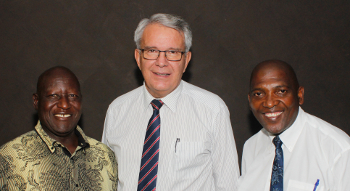Latest News Archive
Please select Category, Year, and then Month to display items
08 August 2023
|
Story EDZANI NEPHALELA
|
Photo EDZANI NEPHALELA
 Mbulelo Aven Jafta, Xhariep Municipality Corporate Services Director, and Dr Engela van Staden, Deputy Vice-Chancellor: Academic at the UFS, sign a memorandum of understanding to enrich various communities in the Xhariep Municipality areas through leadership training.
Mbulelo Aven Jafta, Xhariep Municipality Corporate Services Director, and Dr Engela van Staden, Deputy Vice-Chancellor: Academic at the UFS, sign a memorandum of understanding to enrich various communities in the Xhariep Municipality areas through leadership training.
The University of the Free State (UFS) has signed a memorandum of understanding with the South African Local Government Association (SALGA) and the Xhariep Municipality that is aimed at positively impacting communities through strategic partnerships. The organisations plan for their collaboration to make a significant difference by training 35 of their employees via the UFS Business School – 15 will undertake the Foundation Skills Short Learning Programme, and 20 the Bachelor’s degree in Management Leadership.
This joint effort will equip these employees with essential skills and knowledge and empower them to carry out their responsibilities efficiently and effectively. Rooted in the UFS’s Vision 130, this initiative fosters positive change within the community by enhancing social justice and innovation.
Dr Engela van Staden, Deputy Vice-Chancellor: Academic at the UFS, emphasised the university's dedication to human resource development and empowering individuals. “We were very excited when we got this engagement with you, and I hope it will be fruitful for you, because that’s the intention. We are also reaching out to other municipalities because we are doing it for our country, and the sooner we do it, the better the services you will deliver to people.”
Xhariep Municipality expressed gratitude for the collaboration, recognising its significance in empowering its employees. Mbulelo Aven Jafta, Corporate Services Director at the municipality, thanked the university for accepting the partnership. “As a municipality, we are interested in capacitating our employees to perform their duties optimally. It is through these partnerships that we reach our intended targets. This is the first two projects, and many more will be coming as our partnership progresses, and we intend to use this opportunity to the best of our abilities.”
Jafta said that such partnerships encourage a more interconnected and interdependent world. “As organisations work towards common goals, they create a ripple effect that can lead to a brighter and more promising future and play a vital role in shaping a positive and sustainable future.”
New developments in the Faculty of Theology and Religion
2017-08-30

Bishop JM Khumalo, Apostolic Church of
Christ; Prof Fanie Snyman, Dean of the
Faculty of Theology and Religion; and
Rev Simon Galada, Wesleyan Church,
at the faculty’s official opening in
February 2017.
Photo: Eugene Seegers
At a meeting of the UFS Council last year, a name change was accepted for the Faculty of Theology, renaming it to the Faculty of Theology and Religion. This change signals openness in approach to other religions, in addition to those of Christian denominations. This is a development that took root in Europe a few years ago. Furthermore, a growing field of interest is the study of the impact religion has had and still has, even in highly secularised societies. This name change is the first of its kind in South Africa, which means that the faculty will lead the way in transformation and impact-based religious studies.
Exciting times lie ahead
Prof Fanie Snyman, Dean of the faculty, says of these refinements: “The new name and restructuring of departments will lead to a new synergy that will have an impact on our teaching and research in the faculty. Exciting times lie ahead for the Faculty of Theology and Religion!”
Apart from the change in the name of the faculty, departments within the faculty were also regrouped, with new names. The Departments of Old Testament and New Testament merged to become the Department of Old and New Testament Studies, while the Departments of Systematic Theology and Ecclesiology merged and will now be known as the Department of Historical and Constructive Theology. The former Departments of Practical Theology and Missiology became the Department of Practical and Missional Theology. The Department of Religion Studies remained unchanged to emphasise the importance of religion in South Africa and the world at large.
Error! Hyperlink reference not valid.
Distinction of theological disciplines
The rationale for these groupings is the distinction of theological disciplines in terms of the study of texts (Old and New Testament), sources (Systematic Theology and Church History), and practices (Practical Theology and Missiology). One benefit of these newly-constructed departments is that they will be more cost-effective, but the more important advantage is that this will stimulate discussion and research across the various theological disciplines.